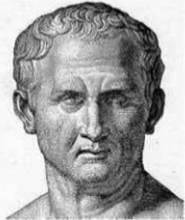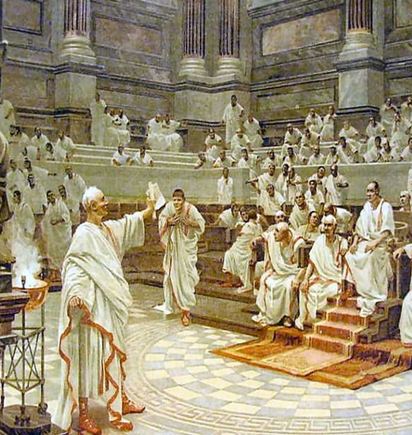The Roman Republic Activity
Your Legal Writes
The good of the people is the greatest law.
Marcus Tullius Cicero
Marcus Tullius Cicero
|
Background Information:
Like you, the Romans wished to be treated equally among their peers. In order to make things fair, they needed laws that applied to every Roman citizen. After a 16-year battle with their last king, Tarquin the Proud, the Romans vowed never to be ruled by a king again. In 509 BCE, they created the Roman Republic. When the power to govern rests in the will of the people and when the people's will is enacted by a leader who is elected to represent them, that state is called a republic. |
Rather than simply electing a leader, however, citizens in this new Republic also wanted to have a say in what rules applied to them. They wanted to vote on the laws under which they would lead their new lives.
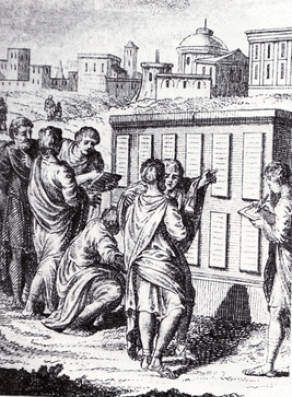
The leaders of the newly formed Roman Republic created new laws called the Twelve Tables. The laws were engraved on bronze tablets and put on display at the Forum so that everyone could see them. These laws addressed concerns about property rights, crime, family, theft, marriage and inheritance, and they applied to every Roman citizen.
The laws did try to be fair, but keep in mind that in the Roman Republic there were two levels of of citizenship - the patricians and the plebeians. Patricians and plebeians had equal rights under the law, but they were not granted equal participation in government, or in making laws.
While trying to balance the competing desires of the patricians and the plebeians, it was often hard to know the will of the people. More, knowing the people's will did not make it any easier to create laws that treated all citizens fairly. Nor was it always useful in efforts to keep the Republic from falling apart. Just like politics today, Roman politics sometimes seemed like a mess. The Roman statesman, Cicero, summarized Roman politics this way:
The laws did try to be fair, but keep in mind that in the Roman Republic there were two levels of of citizenship - the patricians and the plebeians. Patricians and plebeians had equal rights under the law, but they were not granted equal participation in government, or in making laws.
While trying to balance the competing desires of the patricians and the plebeians, it was often hard to know the will of the people. More, knowing the people's will did not make it any easier to create laws that treated all citizens fairly. Nor was it always useful in efforts to keep the Republic from falling apart. Just like politics today, Roman politics sometimes seemed like a mess. The Roman statesman, Cicero, summarized Roman politics this way:
Nothing is more unpredictable than the mob, nothing more obscure than public opinion, nothing more deceptive than the whole political system. "Nihil est incertius volgo, nihil obscurius voluntate hominum, nihil fallacius ratione tota comitiorum."
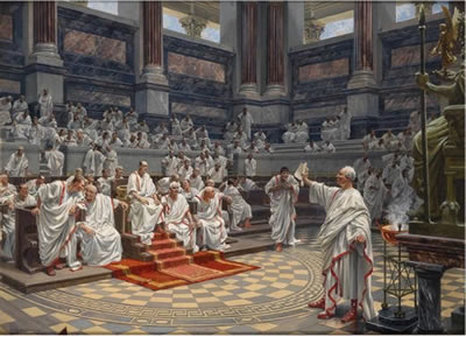
Trouble in Paradise:
For this activity, you are going to play the role of Roman lawmaker. The Republic confronts crises at every turn. Involved in politics, your job is to enact laws that are fair, that treat all citizens equally and, of course, that keep the Republic from falling apart.
Can You Save the Roman Republic?
You are a member of the Roman Senate. You are a patrician and that means that you have some power. You are not, however, a god. You must consider the will of the people. Because you have ambition to be elected Consul some day, you must also keep your rich friends happy.
Before the Senate are three major problems facing the Republic. Your job is to propose a solution to one of the three problems. You must write your solution in the form of a law or series of laws (beyond what is already in the Twelve Tables). In addition, you will write a one paragraph speech to be given before the Senate. The aim of your speech is to persuade your fellow senators that your law is the best solution to the crisis that confronts Rome.
For this activity, you are going to play the role of Roman lawmaker. The Republic confronts crises at every turn. Involved in politics, your job is to enact laws that are fair, that treat all citizens equally and, of course, that keep the Republic from falling apart.
Can You Save the Roman Republic?
You are a member of the Roman Senate. You are a patrician and that means that you have some power. You are not, however, a god. You must consider the will of the people. Because you have ambition to be elected Consul some day, you must also keep your rich friends happy.
Before the Senate are three major problems facing the Republic. Your job is to propose a solution to one of the three problems. You must write your solution in the form of a law or series of laws (beyond what is already in the Twelve Tables). In addition, you will write a one paragraph speech to be given before the Senate. The aim of your speech is to persuade your fellow senators that your law is the best solution to the crisis that confronts Rome.
First Things First: As you prepare for your speech before the Assembly, first follow these tips:
- Carefully read all 3 crises before you choose one to solve with the proposal of a new law.
- Make a list of the people who are affected by the crisis.
- Brainstorm ways to solve the crisis in ways that are fair to all people. Write down your ideas - If you think it, ink it!
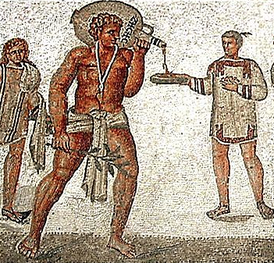
Example Problem: Slaves are brought back from each land that is conquered by Rome.
Example Background: These slaves are assigned jobs in the factories and on the farms, and they work for much less than any free Roman can. Basically, the slaves are putting free citizens, who are laborers and small farmers, out of work. Patricians benefit, but poor Romans are starving to death. What can the government do?
Example Solution: In order to solve this problem, you might write a law to do one of the following: a) give land to poor Romans, b) free the slaves, or c) create a welfare program that takes care of the people.
Then, of course, you would propose a law that is fair to all parties and write your persuasive speech to the Senate, hoping they will enact your law.
Example Background: These slaves are assigned jobs in the factories and on the farms, and they work for much less than any free Roman can. Basically, the slaves are putting free citizens, who are laborers and small farmers, out of work. Patricians benefit, but poor Romans are starving to death. What can the government do?
Example Solution: In order to solve this problem, you might write a law to do one of the following: a) give land to poor Romans, b) free the slaves, or c) create a welfare program that takes care of the people.
Then, of course, you would propose a law that is fair to all parties and write your persuasive speech to the Senate, hoping they will enact your law.
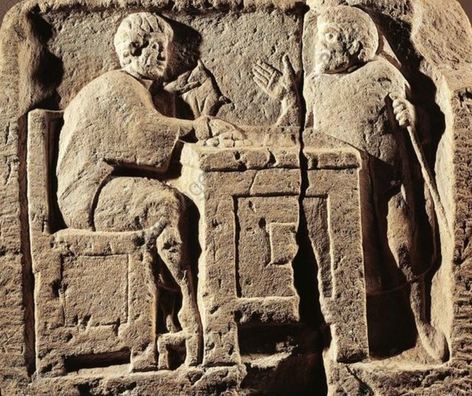 Stone relief of Roman tax collector.
Stone relief of Roman tax collector.
Problem 1. Rome Needs Tax Money.
Background: The government needs to pay the army, build roads, sewers, aqueducts, arenas, and pay for the welfare program in Rome. To get this tax money, Rome uses tax farmers. Tax farmers are Romans who pay a fee to the Roman Republic for the privilege of collecting taxes from a territory (kind of like purchasing a business licence).
To cover their expenses, Tax Farmers then charge a tax against every citizen in their territory. But, there is no set amount of tax to charge. Tax collectors go around the territory with soldiers and collect whatever taxes they want to charge. Of course, the Tax Farmers expect to make a profit. After all, they are in the business of tax collection. However, under this system, there are many abuses. The government can not control how each Tax Farmer runs their individual business.
Consider:
The Problem: How can you stop the abuses while still continuing to get the tax money we need to run the Republic?
Background: The government needs to pay the army, build roads, sewers, aqueducts, arenas, and pay for the welfare program in Rome. To get this tax money, Rome uses tax farmers. Tax farmers are Romans who pay a fee to the Roman Republic for the privilege of collecting taxes from a territory (kind of like purchasing a business licence).
To cover their expenses, Tax Farmers then charge a tax against every citizen in their territory. But, there is no set amount of tax to charge. Tax collectors go around the territory with soldiers and collect whatever taxes they want to charge. Of course, the Tax Farmers expect to make a profit. After all, they are in the business of tax collection. However, under this system, there are many abuses. The government can not control how each Tax Farmer runs their individual business.
Consider:
- Tax Farmers often collect more money than the people can afford, so the people have to borrow money, eat less, or go without needed items like new clothes, tools, or medical care.
- Tax Farmers and their soldiers can be abusive to people – stealing from their homes and beating or killing people they do not like.
- If people cannot afford the taxes, the Tax Farmers will sometimes kidnap them, their wives, or their children and sell them as slaves to get the money for their taxes.
- The Tax Farmers often charge people differently based on what towns they live in, how rich they are, if they are friends or family of the tax collector, or if they are immigrants to that territory.
- The Roman government does not monitor these tax collectors because the Tax Farmers always pay the government in advance.
The Problem: How can you stop the abuses while still continuing to get the tax money we need to run the Republic?
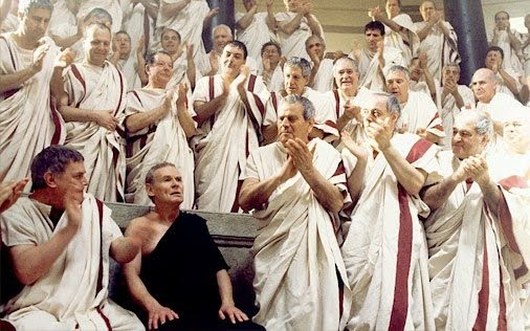 Over time, the Roman Senate became increasingly corrupt.
Over time, the Roman Senate became increasingly corrupt.
Problem 2. Under the Republic, Elected Officials Use Their Positions to Get Rich.
Background: To get elected, some government officials are buying people’s votes. Some poor people are quite happy to sell their votes to the highest bidder. Under this system, many people are elected who are bad governors. Only interested in gaining more power and more wealth, they seek elected office for reasons that don’t help the people they are elected to serve.
Consider:
The Problem: How can you create laws to stop elected officials from using their position for personal gain problem?
Background: To get elected, some government officials are buying people’s votes. Some poor people are quite happy to sell their votes to the highest bidder. Under this system, many people are elected who are bad governors. Only interested in gaining more power and more wealth, they seek elected office for reasons that don’t help the people they are elected to serve.
Consider:
- They use their position in the government to have their own businesses or their friends and family’s businesses get all the government contracts for projects.
- They use their position to force tax collectors to pay them more money, and thus the tax collectors raise taxes for the common people.
- They demand payment and gifts from wealthy businessmen in exchange for extra protection of their stores and businesses.
- They do not appoint smart judges – only their friends who are just ding it because it pays a high salary.
- They use the government tax money for parties and not for fixing roads, bridges, or aqueducts in their territories
The Problem: How can you create laws to stop elected officials from using their position for personal gain problem?
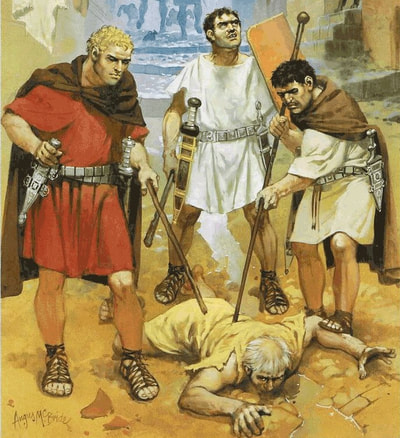 Private protection was often not much more than paid gangs of thugs.
Private protection was often not much more than paid gangs of thugs.
Problem 3. Under the Republic, Rome Did Not Have a Police Force.
Background: Wealthy Roman patricians hire guards to protect their palaces, their estates, their homes, and them and their families. Whenever they travel through the streets, their guards protect them, sometimes by being cruel to plebeians.
Besides the really, really rich, many businessmen also hire their own guards to protect their businesses, collect debts, and bully other businesses for control of certain roads, neighborhoods, and ports. As if that was not bad enough, there are also gangs that control sections of neighborhoods, towns, and even some cities with their own small armies of up to 100 men. But all these private soldiers cause many problems for regular plebeians.
Consider:
The Problem: How can you create laws to solve this problem without making businesses suffer too much?
Background: Wealthy Roman patricians hire guards to protect their palaces, their estates, their homes, and them and their families. Whenever they travel through the streets, their guards protect them, sometimes by being cruel to plebeians.
Besides the really, really rich, many businessmen also hire their own guards to protect their businesses, collect debts, and bully other businesses for control of certain roads, neighborhoods, and ports. As if that was not bad enough, there are also gangs that control sections of neighborhoods, towns, and even some cities with their own small armies of up to 100 men. But all these private soldiers cause many problems for regular plebeians.
Consider:
- Private armies and guards often clash, which makes the streets unsafe for innocent bystanders.
- There is high crime – private soldiers are arrogant. They are often little more than street gangs, stealing from people and getting into fights with one another.
- Rome's streets are never safe for citizens after dark.
- Opening a business is difficult because unless you have men willing to be your guards (and money to pay them) other businessmen won’t let you open a business that makes too much money.
The Problem: How can you create laws to solve this problem without making businesses suffer too much?
|
Speech Before the Assembly:
|

Grades: You will receive 100 points for proposing your solution in the form of a new law and for the speech you make before the Assembly. When you are presenting your new law, however, the other Senators (your classmates) will have a chance to point out the flaws or holes in your arguments and reasoning. For every problem they see in the law(s) you are proposing, you will lose 5 points. Remember, your solution to the crisis needs to represent the interests of all the people, so your laws better take every possible situation into account or else you might lose most of your points.

